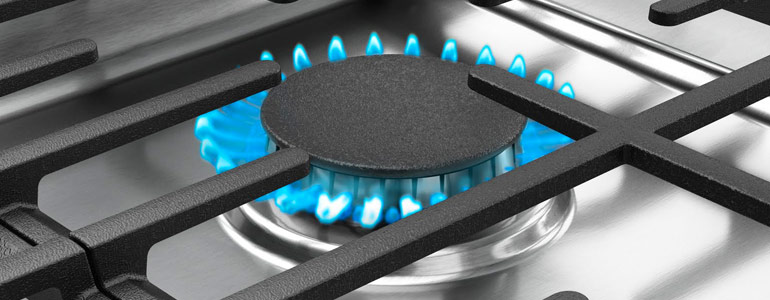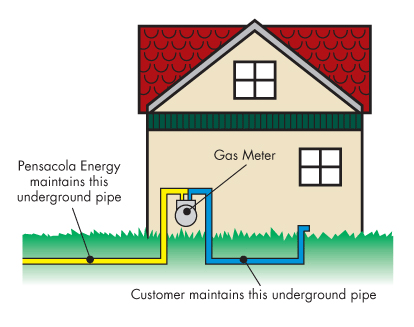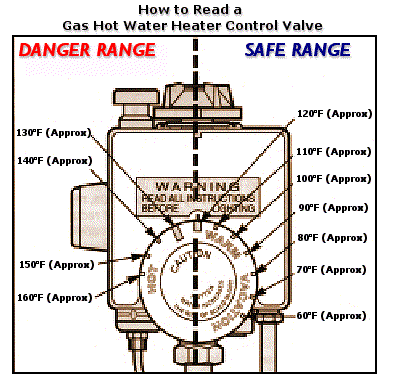
Natural Gas Safety / Home Safety Tips
How Can I Keep My Gas Appliance Safe?
Follow manufacturer instructions when operating appliances. Keep all appliance user manuals together in one convenient location.
You can perform some routine maintenance on your gas appliances yourself in accordance with manufacturer’s specifications. But repairs, installations and disconnections are jobs for qualified service people. When in doubt, call your appliance repair service provider or heating/plumbing contractor for advice. You can find one in the Yellow Pages under “Appliances” or “Heating.”
What Do I Do if My Gas Service Has Been Flooded?
- If your appliances have been in contact with water, please contact a plumbing or heating contractor to make sure the appliance is safe to operate.
- If we have shut your gas service off for safety reasons, please contact Pensacola Energy.
What Should I Do If I Smell Natural Gas?
Most people are familiar with the distinctive “pungent odor” aroma added to natural gas. We add this odor (mercaptan) so that it’s easy to detect. If you smell gas in your home, or suspect a gas leak, leave immediately, and from a safe location call Pensacola Energy Emergency Services at 850-474-5300 right away. Smell gas outdoors? Leave the area immediately and call Pensacola Energy Emergency Services at 850-474-5300 and tell us the exact street location and cross streets. We’re here 365 days a year to serve you.
If you smell gas, please follow these steps:
- Leave the building immediately, taking all occupants and pets. From a safe location, call Pensacola Energy at 850-474-5300 right away.
- Leave doors and windows open; but do not re-enter the building to do so.
- Don’t use phones, computers, appliances, elevators, garage door openers, touch electrical outlets, switches, doorbells, smoke or use an open flame.
- Don’t position or operate vehicles or power equipment where leaking gas may be present.
If the odor of gas is strong, don’t use your telephone, including your cell phone. All occupants should leave the building immediately. Then, call Pensacola Energy from a nearby phone.
Every day, natural gas pipelines safely carry one of the world’s most efficient, reliable and environmentally friendly fuels to businesses, homes and neighbors like you. Preventing pipeline emergencies is important to employees of natural gas companies like ours. Because we are part of your community and are your neighbors, too.
For our customers and everybody who lives or works near our piplines…
For excavators, including anyone digging on public or private property…
For emergency and public officials…
Did You Know You Can Help Prevent Natural Gas Pipeline Emergencies?
Know what’s below. Call 811 before you dig.
If you plan to excavate, dig, bore or tunnel in a location where a buried gas line may be, please call 811 or Sunshine State One-Call of Florida at 1-800-432-4770. Call between the hours of 6am – 5pm, Monday – Friday, and at least 48 hours before starting the proposed work.
Whether you’re planting trees or shrubs, building a deck, installing a fence or mailbox post, be safe and call 811 before you dig. If there are buried natural gas facilities in the path of your activity, an Pensacola Energy representative will be notified to mark the location of the facilities at no expense to you.

Maintain Your Buried Gas Piping
If you have buried natural gas piping for a generator, pool heater, workshop, or other use on your property, then you should have this underground piping checked periodically to ensure that it does not corrode and/or leak. Underground gas piping between the gas meter and a home or building is the maintenance responsibility of the homeowner or building owner. We advise using a licensed gas contractor to assist in locating, inspecting, and if necessary, immediately repairing any buried gas piping. If you have any questions, please call Pensacola Energy at 850-436-5050. (You may disregard this notice if you do not have buried gas piping beyond the gas meter.)
You Can Help Prevent Natural Gas Pipeline Emergencies
Though natural gas pipeline incidents are uncommon, you should know their telltale signs.
- Look. Blowing dirt, bubbling creeks or ponds, dry spots in moist areas or dead plants surrounded by live, green plants may indicate a natural gas leak.
- Listen. Near a gas appliance or line, there may be a hissing sound when natural gas is leaking.
- Smell. Stay alert for the distinctive, rotten-egg-like smell of natural gas. You should take action anytime you detect even a small amount of this odor in the air.
- If you smell gas or suspect a gas leak, call Pensacola Energy Emergency Services at 850-474-5300.
What is Carbon Monoxide?
Carbon monoxide (CO) is a normal by-product of fuel combustion, but high levels of it indoors can be dangerous to your health. Typical heating fuels (oil, coal, wood, gasoline, kerosene, diesel fuel or natural gas) can create carbon monoxide.
Carbon monoxide can build up to a dangerous level if a fuel-burning appliance isn’t operating properly or is not safely venting fuel combustion by-products.
All fuel-burning appliances need air for safe and efficient combustion to take place. Without sufficient fresh air, harmful levels of carbon monoxide may occur.
Running a vehicle inside a garage is the most common carbon monoxide danger. But during the heating season, when fresh air circulation is reduced, it’s especially important to prevent carbon monoxide buildup indoors.
Portable combustion engine generators should not be operated indoors to prevent the buildup of carbon monoxide.
How Can Carbon Monoxide Be Dangerous?
Carbon monoxide has no odor, no color and no taste. Because it combines with the body’s blood and prevents it from absorbing oxygen, carbon monoxide can cause serious illness and, in extreme cases, can even be fatal.
How Can I Identify Carbon Monoxide Problems?
Indicators of high levels of carbon monoxide in the home can include extremely stuffy, stale air or water condensation dripping on the inside of windows.
Symptoms of carbon monoxide exposure can include headaches, nausea, dizziness, coughing, ringing in the ears, spots before the eyes and reddened skin color.
If you notice any of these warning signs, get outside to fresh air and get to the doctor immediately.
A CO alarm may be the best way to detect the presence of carbon monoxide. It is recommended that the alarm be marked “UL 2034,” indicating that it meets the widely accepted standards set by Underwriter’s Laboratories, Inc. (UL). It is best to install CO alarms near bedrooms. CO alarms must be maintained in accordance with manufacturer’s specifications to avoid false alarms and other operational problems.
How Can I Prevent Carbon Monoxide Problems?
- Keep your chimney and vent piping clean. Have your chimney, heating system and water heater flue vent piping inspected regularly and cleaned by a professional when necessary.
- Install and properly maintain one or more CO alarms near bedrooms. Be sure the alarm is certified according to the “UL 2034” standard.
- NEVER burn wood or coal in an indoor area without proper venting. Portable gas and charcoal grills intended for outside use should never be used indoor or even inside an open garage.
- NEVER use your gas range to heat your apartment or house. Your range’s oven and top burners are designed to cook your food, NOT to heat your home. Prolonged use can reduce oxygen levels in the home and contribute to excessive levels of carbon monoxide.
If you suspect a carbon monoxide problem, leave the building immediately to get fresh air. Then call 911.

Using Natural Gas Wisely
To save energy and money, set the temperature on your water heater to 120 degrees, or no higher than necessary. Be aware that higher temperatures may cause scalding, and the risk of scalding is greater for children and the elderly. Make sure your water heater is set to a safe temperature. Check the water temperature before placing a child in the bathtub, and never leave a child alone or with other young children in the bathtub.
Check Your Gas Connections
If you have natural gas appliances, the gas connectors need to be inspected regularly and replaced as needed. Certain kinds of flexible connectors manufactured between 1970 and 1980 may fail over time and need to be replaced. An uncoated brass gas appliance connector may have this flaw and should be replaced with a new stainless steel connector.
Here are some guidelines to follow to help keep your family and home safe:
- Do not move your gas appliances to check the connectors yourself – stressing connectors can cause them to crack and leak.
- Only a qualified, licensed, gas contractor should check your connector and replace it.
- Avoid repeated use of cleaning solutions or insect sprays around appliance connectors – these solutions can cause corrosion.
- Do not allow wiring or other objects to touch the connector.
- Connectors should always be replaced whenever an appliance is replaced or moved from its location.
Corrugated Stainless Steel Tubing (CSST)
Do you have this natural gas piping product installed in your home or business? CSST is a flexible, stainless steel pipe used to supply natural gas in residential, commercial and industrial structures. CSST is often coasted with a yellow, or in some cases, a black exterior plastic coating.
CSST should NOT be confused with flexible natural gas appliance connectors – the product that joins an appliance to your home or building’s natural gas supply line. Flexible connectors attach directly to the gas appliance from the wall or floor; while CSST is usually routed on top of ceiling joists in attic spaces, or beneath, through and alongside floor joists in basements, and inside interior wall cavities.
Be aware that lightning can strike a structure containing CSST and pose a risk of traveling through the structure’s natural gas piping system and causing a gas leak or fire in some cases.
If work has been performed on the natural gas piping system in your home or business since 1990, check to see if CSST was installed. If you’re unsure as to whether or not CSST was installed in your home or business, contact the company that performed the gas piping work for information or to arrange for a professional inspection.
If you find CSST after the inspection, then it’s recommended that you contact a qualified, licensed electrician. A bonding device should be installed on your natural gas system in order to reduce the chances of a natural gas leak or fire.
Remember, CSST has the potential to leak if your home or business is struck by lightning and the CSST is not properly bonded and grounded.
Flammable Ignition Awareness
Gasoline and other flammable liquids can be dangerous if not handled or stored safely. Never use them indoors, always store in an approved container, and away from children.
- Keep gasoline and other flammable liquids away from children.
- Never use gasoline or other flammable liquids indoors or in the same room or area as a natural gas appliance or other ignition source.
- Keep gasoline ONLY in an approved gasoline container, make sure the container is tightly sealed, stored in a cool place, on a high shelf, and away from the house if possible.
- Talk to your children about the dangers of flammable liquid products.
Don’t Risk Breaking the Law – Call Before You Dig.
It’s a fact: Excavation work is the most common cause of natural gas pipeline emergencies. Before excavating, call Sunshine State One Call of Florida at 811 when calling from Florida and 1-800-432-4770 when calling from outside Florida, so utility lines can be professionally marked prior to digging. Both the call and the service are free.
